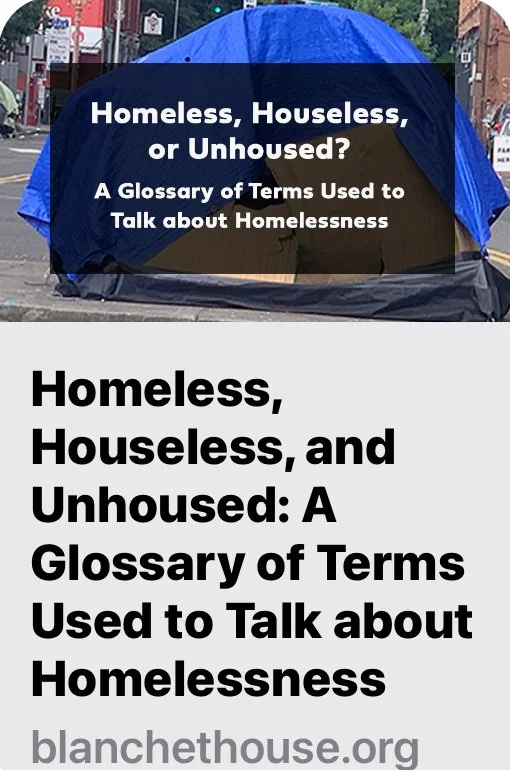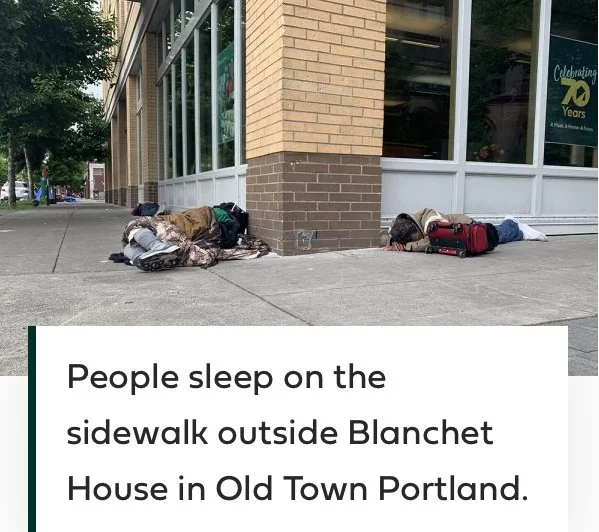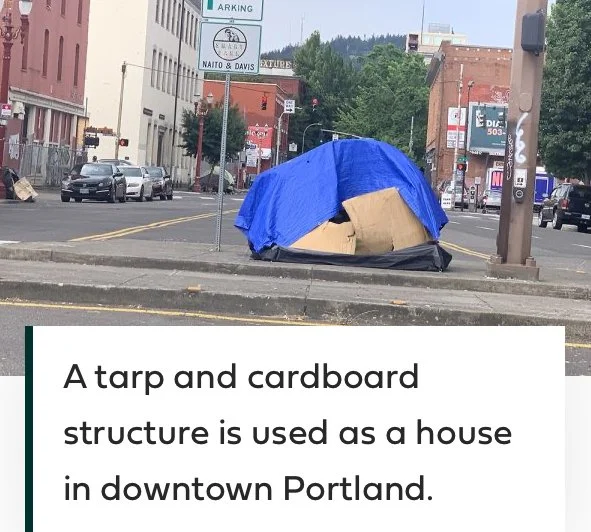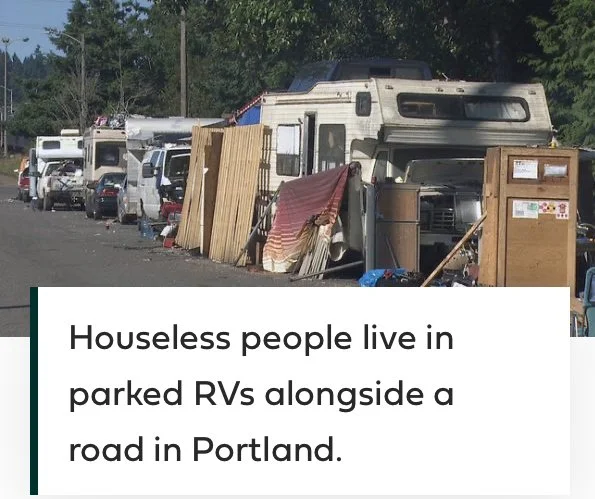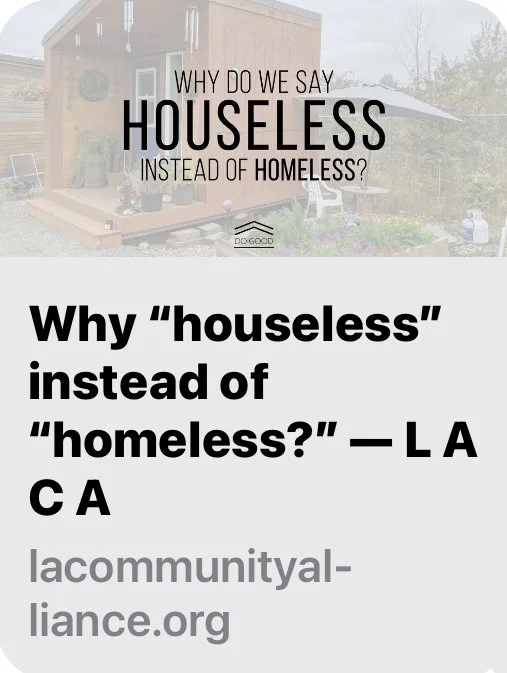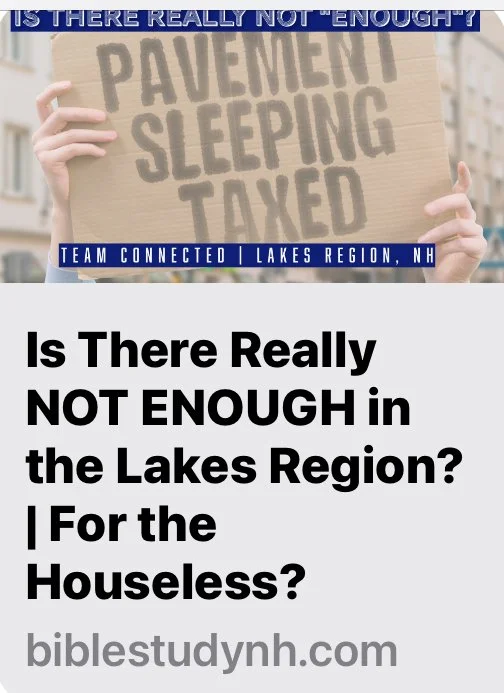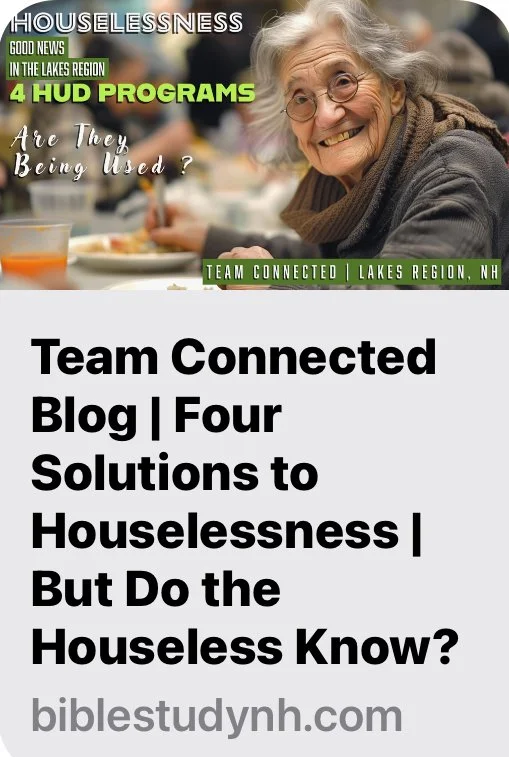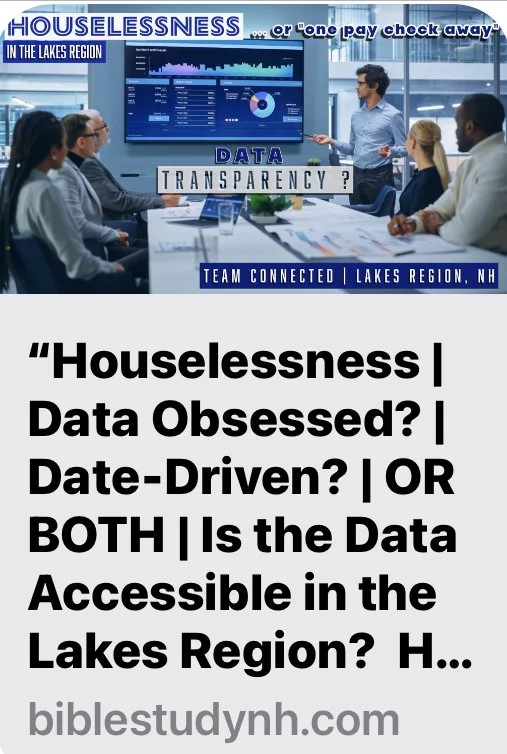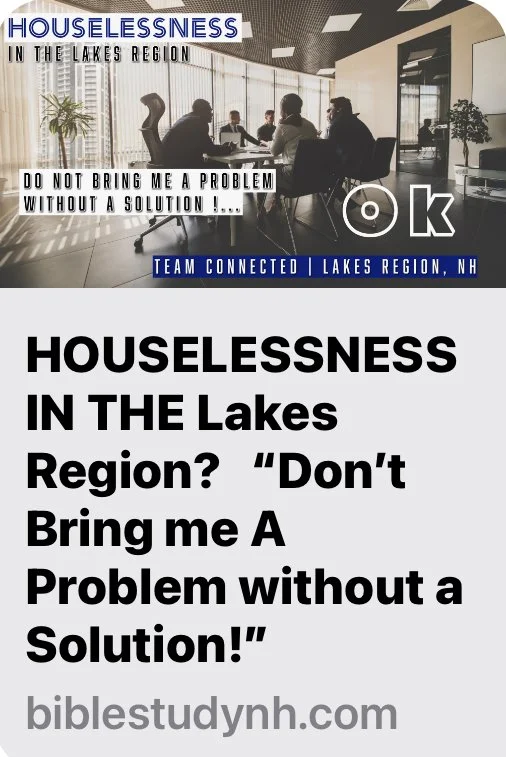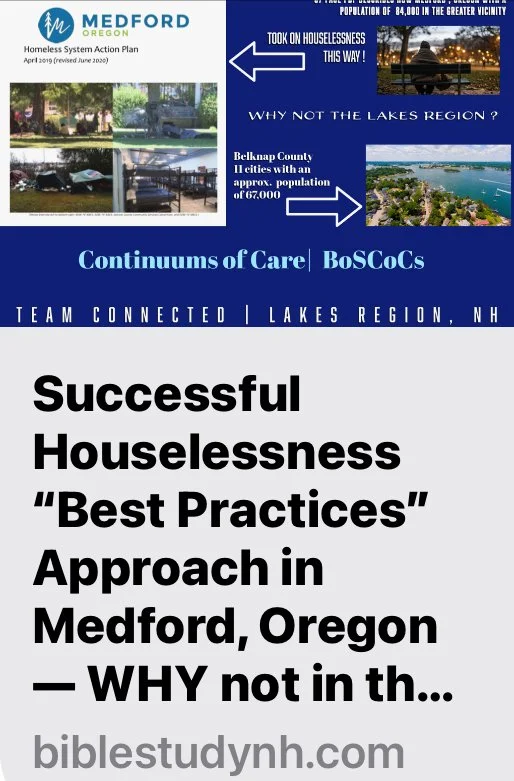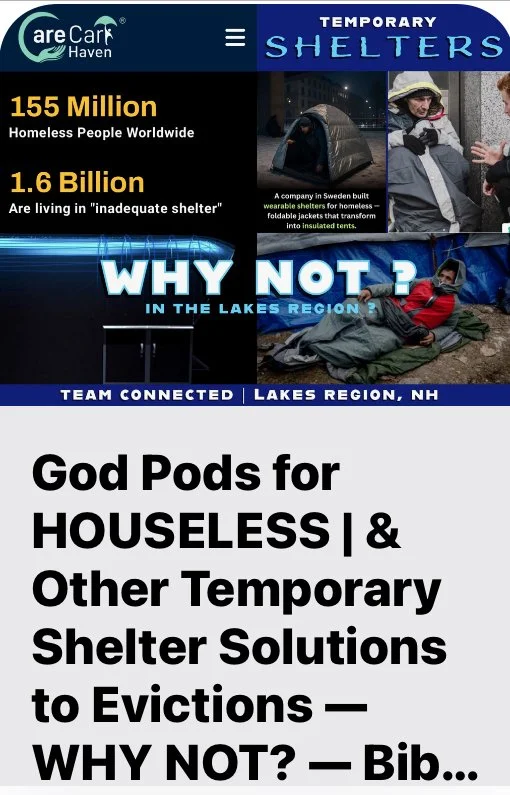Why we use the word “HOUSELESS” and not “HOMELESS” in Lakes Region Discussions
Three TEAM CONNECTED Blogs have been posted in the last 2 weeks using the phrase HOUSELESS as a term to discuss what many have described in Lakes Region news articles in The Laconia Sun as well as Letters to the Editor authored by mayoral and councilman candidates for upcoming November 2025 elections. The current state of HOUSELESS human beings and their families (including those — one paycheck away from that condition) has been in the local news cycles and remains so. Some Lakes Region neighbors have asked WHY use HOUSELESS and not HOMELESS. The answer is simple: WORDS MATTER!
In politics, nothing happens by accident. If it happens, you can bet it was planned that way. — Franklin D. Roosevelt
Because words have power, and words matter to both policy makers and to Lakes Region neighbors — the following is provided. TEAM CONNECTED’S use of HOMELESS in blog posts is also not an accident.
Homeless, Houseless, and Unhoused: A Glossary of Terms Used to Talk about Homelessness
https://blanchethouse.org/homeless-houseless-unhoused-glossary-about-homelessness/
Houseless, and Unhoused: A Glossary of Terms Used to Talk about Homelessness
Are you confused by the different words used to describe homelessness? You’re not alone. Should you use homeless, houseless, or unhoused when describing someone’s circumstances? We hope this glossary about homelessness helps.
In recent years advocates and activists have begun to use the word unhoused or houseless to describe individuals without a physical address.
However, government agencies and research institutions continue to use the word homeless when reporting on people experiencing homelessness or housing insecurity.
Why are the words changing?
Words Have Power
The words we use to talk about people and describe their circumstances are important. Words can center or diminish a person’s humanity.
Disability rights activist Emily Ladau rightly says that “language is one of the most important signals that we have to demonstrate our acceptance or rejection of a person’s identity.”
So, let’s think about what words used to describe a person’s homelessness mean and imply. And as we consider language, let’s also consider that the people we’re talking about have opinions about this, as well, and deserve to have ownership over how they identify themselves and are identified by others.
The following is meant as a guide rather than a prescription.
Homeless
Homeless is a word most often used to describe people living unsheltered on sidewalks, in tents, camps, cars, or RVs. The Merriam-Webster dictionary defines the word homeless as “having no home or permanent place of residence.”
Houseless
More frequently, the word houseless is used in place of homeless. The reason is the important distinction between a house and a home. People described as homeless are not necessarily without homes.
Home
Home is the word we use to describe the personal community in which we live. Home includes our loved ones and pets, our important or sentimental possessions and valuables, and our traditions and rituals.
House
House is the structure in which all of this takes place. It’s why we say, “home sweet home” and not “house sweet house.” We experience homesickness, not house-sickness.
If “home is where the heart is,” then people experiencing homelessness absolutely have homes. But they don’t have a house. They may have shelter, but not shelter we ordinarily think of as a house.
People Experiencing Homelessness or Houselessness
Sometimes the phrase “people experiencing homelessness or houselessness” is used. This phrase emphasizes the humans at the center of this crisis rather than the houses.
This phrase also underscores that the problem isn’t the people themselves but the lack of housing and affordable housing. These are individuals experiencing the effects of our housing shortage and increasingly unaffordable rental market. They are technically homeless, houseless, and unhoused.
Houses Come in Many Shapes and Sizes
Above I wrote that people experiencing houselessness don’t have houses. That’s not entirely accurate. Houses can come in all shapes and sizes and often vary among cultures and histories. In that light, even houselessness or people experiencing houselessness seems not the best terminology.
This brings me to the phrases “housing insecurity” and “people experiencing housing insecurity.”
Housing Insecurity
The term housing insecurity most completely describes the varied experiences and challenges of people who are homeless/houseless, as well as those who are at risk of becoming so. Using this terminology emphasizes the factors that contribute to a person’s homelessness/houselessness.
There are many contributing factors, all of them extremely complex and essential to address if we are ever to fully solve this crisis.
Mental health or addiction is perhaps the most visible contributing factor right now. This is certainly true in Old Town, where Blanchet House serves.
Mental illness and addiction often go hand in hand because people experiencing the trauma of living on the street—on top of the trauma that may have led them there—medicate to dull the pain and soothe their anxiety.
“Homeless first, addict second” is a phrase we hear from people we serve.
Those in addiction recovery also are housing insecure. We frequently meet people whose recovery was successful until something caused them to relapse, often a personal tragedy like the chronic illness or death of a loved one. Relapse leads to loss of employment which then leads to loss of housing. This is not an uncommon story.
Housing Affordability
Affordability is definitely a key component of housing insecurity. People lose their housing because they can no longer afford it. Many people in our community exist on the knife’s edge of losing their housing because they are “rent burdened” or “severely rent burdened,” which means too much of their monthly income is required to sustain it. Any change in their financial situation—reduced hours at work, an unexpected health care or repair bill, increased rent—can result in houselessness.
This means we can’t talk about housing affordability without addressing contributing factors such as the lack of living wages in our community, high health care costs and the lack of insurance, the lack of affordable daycare, and the general effects of high prices all around (gas, groceries, utilities).
The high cost of rent often requires two or more housing insecure individuals to room together. While doubling or tripling up can solve paying rent and utilities, it doesn’t make the housing very secure because if one roommate suddenly can’t pay their way, all the roommates may find themselves evicted.
Affordability is crucial, but it isn’t everything because housing also needs to be safe and healthy.
Safe Housing for Homeless, Houseless, or Unhoused
A person’s housing might be unsafe because of who is living there or nearby. People living with an abuser—be it domestic abuse, child abuse, or elder abuse—are housing insecure. People living in a high-crime neighborhood or complex are insecure.
Housing might be unsafe because there is inadequate heating or cooling. It might be unsafe because of environmental pollutants, infestations, or disrepair.
We see stories in the media about predatory landlord or property management situations. Tenants are harassed or even threatened because they complain about their residences being uninhabitable. I spoke to one woman who lived on the second floor of an apartment complex with her children. The fumes from the meth lab below made living there impossible, especially when no one would do anything to help them.
This is the face of housing insecurity.
And housing insecurity is also a historical situation.
Transgenerational poverty, housing discrimination and segregation, and racial discrimination are important factors to be addressed. We know people who became houseless after revealing their sexual or identity preference to family and then had to flee because of the abuse they suffered as a result.
When we acknowledge that the solution to houselessness is more housing, we must underscore that this means safe, dignified housing and that the variety of circumstances that render someone’s housing insecure must be addressed.
“I once was homeless and can relate,” says Jennifer Coon, a Peer Support Specialist at Blanchet House. “I don’t want to offend anyone or put them in a category. I don’t want to make what’s happening in their lives right now define them.”
The physical structure is important, but it’s not the whole picture.
To repeat: some folks ask why use “HOUSELESSNESS” vs other phrases? Here is a second source describing the reasons.
https://www.lacommunityalliance.org/life-skills-blog/houseless
Houseless vs. homeless / unhoused vs. homeless
“Houseless is not a euphemism for homeless. We remind everyone that “houseless” is an adjective. It’s true that the term homeless began this way--initially as part of the phrase “homeless people”--yet it quickly became a noun in the form of “the homeless,” dropping the word “people” altogether and leaving the inescapable impression that these individuals were no longer entirely viewed as people. It removed their humanity.
As a nonprofit, we clearly are very concerned with always recognizing the humanity in the people we serve. That’s why we encourage others to contemplate using “houseless” along with other desirable alternatives such as “unsheltered” and “unhoused,” to avoid invoking the stigma that accompanies “homeless.”
We also advocate making a conscious effort to use any and all of these terms only as adjectives (such as “unhoused people”) or, even better, as an experience (as in “people experiencing homelessness”). The latter choice clearly conveys that this is just a stage of their lives to endure, and not their entire identity.”
Having now read these short descriptions of WHY TEAM CONNECTED uses the phrase HOMELESS, readers are encouraged to read or re-read previous blog posts where HOUSELESS is used to describe this current challenge and opportunities in the Lakes Region.
Links to Six Recent TEAM CONNECTED Blog Posts above:
Is There Really NOT ENOUGH in the Lakes Region? | For the Houseless? https://www.biblestudynh.com/blog-2025/is-there-really-not-enough-in-the-lakes-region-for-the-housless
Team Connected Blog | Four Solutions to Houselessness | But Do the Houseless Know? https://www.biblestudynh.com/blog-2025/team-connected-blog-4-solutions-to-houselessness-but-do-the-houseless-know
Houselessness: Data Obsessed? | Date-Driven? | OR BOTH | Is the Data Accessible in the Lakes Region? HMIS DATA Collection https://www.biblestudynh.com/blog-2025/houselessnessnbsp-data-obsessed-date-driven-or-both-is-the-data-accessible-in-the-lakes-regionnbsp-hmis-data-collection
HOUSELESSNESS IN THE Lakes Region? “Don’t Bring me A Problem without a Solution!” https://www.biblestudynh.com/blog-2025/houselessness-in-the-lakes-regionnbsp-nbspdont-bring-me-a-problem-without-a-solutionnbsp
Successful Houselessness “Best Practices” Approach in Medford, Oregon — WHY not in the Lakes Region? https://www.biblestudynh.com/blog-2025/successful-houselessness-best-practices-approach-in-medford-oregon-why-not-in-the-lakes-region
God Pods for HOUSELESS | & Other Temporary Shelter Solutions to Evictions — WHY NOT? https://www.biblestudynh.com/blog-2025/god-pods-for-houseless-amp-other-temporary-shelter-solutions-to-evictions-why-not

